| SHADOWS ON THE WALL | REVIEWS | NEWS | FESTIVAL | AWARDS | Q&A | ABOUT | TALKBACK | |||||||||||||||||||||
 Shadows off the beaten path Shadows off the beaten pathIndies, foreigns, docs, revivals and shorts...
On this page:
ROMEO AND JULIET: BEYOND WORDS |
THE MISOGYNISTS |
THE RUNAWAYS
| |||||||||||||||||||||
| See also: SHADOWS FILM FESTIVAL | Last update 13.Feb.20 | |||||||||||||||||||||
|
Romeo and Juliet: Beyond Words Review by Rich Cline | 
| |||||||||||||||||||||
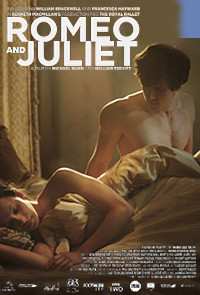 dir Michael Nunn scr Michael Nunn, William Trevitt prd Kwesi Dickson, Michael Nunn, William Trevitt with William Bracewell, Francesca Hayward, Matthew Ball, Marcelino Sambe, James Hay, Romany Pajdak, Kristen McNally, Christopher Saunders, Tomas Mock, Bennet Gartside release UK 16.Dec.19 19/UK BBC 1h33 |
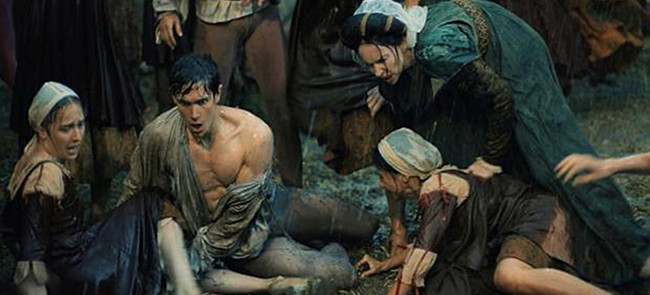 Shakespeare's timeless story is retold in a new way that combines cinema and dance, with no words at all. It's a fresh approach that's perhaps difficult to explain until you see it, as filmmakers Michael Nunn and William Trevitt stage a ballet performance in a real-world setting. With skilful camerawork, a gifted cast and expressive choreography (by Kenneth MacMillan), this iconic story takes on some new emotions, including sexy physicality and darkly earthy emotion. Everyone knows the iconic story. In 16th century Verona, the Capulet family is in an ongoing feud with the Montagues. Lord and Lady Capulet (Saunders and McNally) are preparing their daughter Juliet (Hayward) to marry handsome Count Paris (Mock) when she locks eyes with the cheeky womaniser Romeo Montague (Bracewell), and both are smitten. But the bad blood between these families escalates, so even though Romeo and Juliet get married in secret and have a deliriously happy wedding night, more trouble is brewing. The film was shot on a set in Hungary, cleverly combining elements of a stage production with a more realistic setting. The action moves organically around the town and through the palace chambers, combining elements of drama, action and of course elaborate dance sequences to Prokofiev's classic score. Photographed by Trevitt, the camera is deployed variously in long, wide shots as well as intimate close-up, plus some gritty verite during an elaborate, tense swordfight in the crowded streets as a rainstorm turns the ground to mud. It looks gorgeous, and creates a beautifully involving narrative flow. The dancers are superb, using their whole bodies to express their characters' inner thoughts and feelings. Bracewell is playful and charismatic as Romeo, boyishly horsing around with pals Mercutio and Benvolio (Sambe and Hay), and jauntily teasing Juliet's preening cousin Tybalt (Ball) before things turn combative between them. Hayward gives Juliet some feisty energy of her own, refreshingly, and a lovely connection with her nurse (Pajdak). And the chemistry between Bracewell and Hayward has a terrific sizzle to it. Nunn and Trevitt adeptly play on various aspects of sexuality here, including some homoerotic subtext (the muscly men wear painted-on tights) that emphasises the universality of the story and it's various themes about romantic attraction, loyal friendship and family bonds. Even without using any of Shakespeare's words, the story's power is undiminished. And by taking a ballet performance out of the theatre and into the streets, this bracingly original film has essentially created a whole new genre.
| ||||||||||||||||||||
|
The Misogynists Review by Rich Cline | 
| 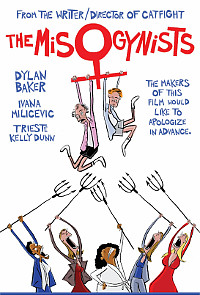 dir-scr Onur Tukel prd Gigi Graff with Dylan Baker, Ivana Milicevic, Trieste Kelly Dunn, Lou Jay Taylor, Matt Walton, Christine Campbell, Nana Mensah, Rudy De La Cruz, Hemang Sharma, Cynthia Thomas, Darrill Rosen, Karl Jacob release US 14.Feb.20 17/US 1h25
| 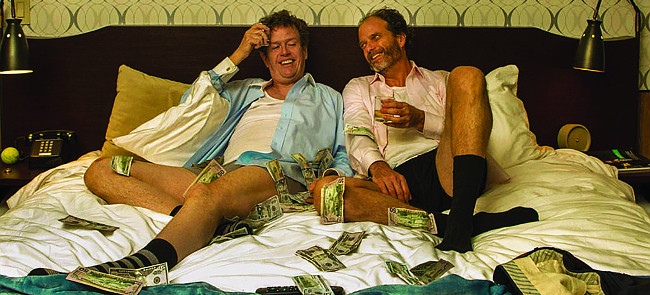 Set on the evening of Election Day 2016, this pitch-black political comedy is so packed with rapid-fire, full-volume conversations that it feels like a stage play. Discussions are barbed as they circle through the issues raised by the election result and the shift in American culture, never shying away from inflammatory comments: these are things people say in private, where they won't be held accountable for their prejudice. Happy that Trump won, newly divorced Cameron (Baker) is living in a hotel room, discussing conspiracy theories with his friend Baxter (Taylor). Cameron believes this is a man's world, and that political correctness was ruining America. Baxter isn't so sure about this, but lies to his wife Alice (Campbell) on the phone about where he is. Fuelled with alcohol and cocaine, Baxter also unsuccessfully tries to counter Cameron's cynicism. Then Cameron asks his usual hooker Sasha (Milicevic) to come over, and to bring a friend (Dunn). And the conversation becomes increasingly out of control. Writer-director Tukel's scattershot, in-your-face script skewers a wide range of opinions, darting back and forth between extremes to explore why people religiously hold on to political beliefs even against all reason, usually blaming others for their woes. Baxter's slippery phone calls with Alice highlight how private beliefs create barriers between people. Cameron berates a friend (Walton) who is getting married, whittles away at Baxter's conscience and even waves a gun around. And the room's TV keeps coming on, ominously showing footage in reverse. Performances are intense, with high-energy, jaggedly edgy discussions between Cameron and Baxter and whoever they happen to interact with along the way. The actors deliver the dialog forcefully, both as passionate believers and people arguing just for the sake of it. In a breathless tour-de-force, Baker gives Cameron nonstop bluster even as he offers the occasional glimpse under the surface. By contrast, Taylor's feelings are more apparent. And Milicevic and Dunn make a terrific duo, bouncing off each other with moments of insight. The interaction spirals through paranoia, racism, fat-shaming, homophobia, sexism and bullying. "This is just locker-room talk," says Cameron, who believes you have to be heartless to succeed; compassion is for losers. Clearly this isn't working out for him, alone in his hotel room, paying women for sex. As the film continues, playing out essentially in real time, it becomes increasingly difficult to watch. This is a shocking depiction of all-to-real attitudes that are happy to tear apart the fabric of society. It's bracingly important, and wrenchingly sad.
|
| The Runaways Review by Rich Cline | 
| 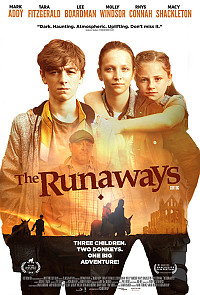 dir-scr Richard Heap prd Mark Thomas, Mario Roberto, Richard Heap with Molly Windsor, Rhys Connah, Macy Shackleton, Mark Addy, Lee Boardman, Tara Fitzgerald, Steve Huison, Sean Ward, Cathy Breeze, James Senneck, Bradley John, Joshua Holden release UK 10.Jan.20 19/UK 1h53
| 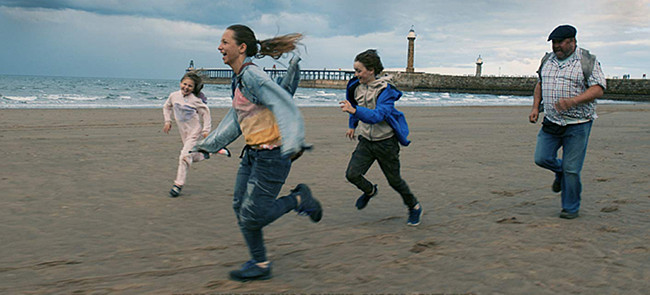 An earthy sense of the characters combines with gorgeous location filmmaking to recount an old-style British tale about children on a life-changing adventure. There's a remarkable darkness to the story that makes the narrative gripping, even though this limits the movie's audience to young teens and up. And while it's overlong, this fine-looking film is a strong first narrative feature for writer-director Richard Heap. When Blythe (Boardman) gets out of prison, he approaches his brother Reith (Addy) in a seaside town in Northern England, unearthing some dark family secrets. So Reith's three kids Angie, Ben and Polly (Windsor, Connah and Shackleton) take two of the family donkeys and run, heading across the Yorkshire countryside. But getting to their mother (Fitzgerald) is an epic undertaking, and Blythe sets out after them, chasing something valuable that Angie has with her. And with the police also looking for them, the big question is who they can trust along the road. Heap gives the film a gently meandering pace that never overplays the various twists and turns, surprising incidents, perilous encounters and capers along the way. Unsurprisingly, it isn't easy to hide when you've got two donkeys with you, and some of the kids' escapes feel very lucky, bordering on absurdity. Not everything feels realistic, including a dose of corny slapstick and the rather predictable villainy Blythe gets up to. There's also a seriously creepy sequence when Angie accepts a ride with a stranger (Ward) who says he wants to help. The three young actors are terrific on-screen, generating some superb sibling chemistry between them, both when they stick together and when they clash against each other. Windsor gets a chance to shine as older teen Angie interacts with the adults in the cast, including several moments in which bleakly shady motives reveal themselves. While Addy has a role that's basically smiley and warm, Fitzgerald and Boardman get a chance to find some sharper edges, making their characters feel perhaps more complex than they were on paper. This is certainly never a sweet and cuddly kids' movie. The relentlessly downbeat tone, patiently unfolding narrative and startlingly grim setbacks make it sometimes difficult to connect with, as does the way Heap drip-feeds vague details about the family's past. But there's plenty of dramatic tension to hold the interest, adding some nuance to a rather thin premise. And Heap's lovely approach to the Yorkshire landscape adds an extra layer to the film that makes it feel timeless.
| 
See also: SHADOWS FILM FESTIVAL © 2020 by Rich Cline, Shadows
on the Wall
HOME | REVIEWS | NEWS | FESTIVAL | AWARDS
| Q&A | ABOUT | TALKBACK | | |||||||||||||


